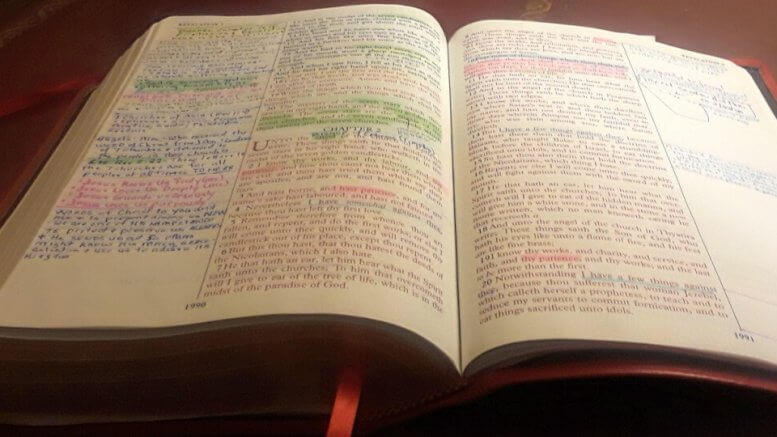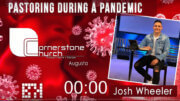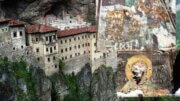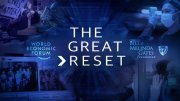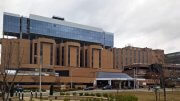From Eric Michael Teitelman, urging all that are “in Christ” to be engaged in our civic responsibilty
Dear brothers and sisters in Christ, Yeshua:
- Yeshua told us: “My kingdom is not of this world. If My kingdom were of this world, My servants would fight, so that I should not be delivered to the Jews; but now My kingdom is not from here.” (John 18:36, NKJV).[i] What a powerful statement. If Yeshua’s Kingdom is not of this world, then ours is not either.
- Yeshua also instructed His disciples not to battle against the kingdoms of the earth, saying, “Put your sword in its place, for all who take the sword will perish by the sword” (Matthew 26:52). He knew that fighting against the Roman Empire would have proven futile, and that was not His purpose for coming, nor was it ours for staying.
- In Yeshua’s final prayers, He said: “I do not pray that You should take them out of the world, but that You should keep them from the evil one. They are not of the world, just as I am not of the world” (John 17:15-16). Again, Yeshua confirmed that we are not of this world, but He also said He would not take us out of it. Instead, He prayed for our protection. We are in the world but not of the world.
This implies that we have a purpose for being here. First, and most importantly, to share the gospel, but maybe also to impart a greater civic responsibility. As Yeshua said:
Let your light so shine before men, that they may see your good works and glorify your Father in heaven” (Matthew 5:16).
How do we balance our patriotism for our nation with the Kingdom of God? Some claim that the United States was founded as a Christian nation. Others are declaring that God has an unbreakable covenant with America.
Do these views suggest we should labor to conform this country into God’s Kingdom before Christ returns? I do not believe so. This belief is called Christian nationalism. And those who expand this theology to the whole earth are called dominionists. Both are antithetical to scripture.
Yes, the Kingdom of God is a present condition in the believer. However, the Kingdom itself is not established in the earth until Christ returns.
In the book of Revelation, we read:
Then the seventh angel sounded: And there were loud voices in heaven, saying, ‘The kingdoms of this world have become the kingdoms of our Lord and of His Christ, and He shall reign forever and ever!’” (Revelation 11:15).
Therefore, the Kingdom is both a present and a future place.
Conversely, does it mean that God will not transform and heal our communities and even our nation if we turn back to Him? Is this our good works that Yeshua spoke about? Quite possibly, and I believe this is an essential part of our civic responsibility. Read the history of the great revivals that have swept this nation and how entire communities were delivered from crime, prostitution, alcoholism, and more.
We are not building heaven on earth as some proclaim. We are leading people into the Kingdom of God by the words we speak from scripture and our actions that demonstrate the love of God. And we have a moral responsibility to God, to submit to governmental authority and uphold His righteous laws and standards for every nation. This is our civic responsibility.
We live in a good nation. It is certainly not perfect, and much of its history is tainted—for example, our mistreatment of the Native Indians and African Americans. And the shedding of innocent blood through abortion. These sins have stained our soil, and their innocent blood cries out to the Lord for His vindication. And yet, as Americans, we carry a euphoric optimism, one that strives to fix and improve that which is broken. We desire to see justice and live peaceably with all men. We follow the golden rule, which is the Judeo-Christian foundation of how this nation was established—do not mistreat others.
Our founding fathers, men like Benjamin Franklin, knew that self-governance came with tremendous civic responsibility. And this freedom could only be secured if men and women lived according to God’s biblical standards. Franklin routinely published sermons from Reverend George Whitefield in his newspaper, the Pennsylvania Gazette.[ii] These articles became a source of inspiration for those living in the American colonies.[iii] And while not all colonists were Christian, most understood the necessity of civility bound by the Laws of a higher Divine order.
From the study of our nation’s history, it is clear that American has never purely been a Christian nation. And yet, the principles of scripture, in large part, became the moral and civic foundation for this great country. This era, greatly influenced by the awakening movements of the 1700s, was highly religious, with Protestant Christianity becoming the predominant faith. Even those who were less religious still held a deep respect for Christianity as a moral and stabilizing influence both in our government and society.[iv]
But much has changed over the past several hundred years. We now live in a pluralist society that holds vastly differing views of God and the Bible. And we are quickly becoming an autonomous culture where an individual’s independent-rule according to either their secular humanist or religious beliefs compete against other people’s views.
The ancient Greeks believed that self-mastery was the ability of each person to become their own master. Plato stated that individuals or groups could not achieve true freedom unless they governed their pleasures and desires.[v]
In biblical terms, this nation is also becoming more like ancient Israel, where it says,
In those days there was no king in Israel; everyone did what was right in his own eyes” (Judges 17:6).
No king implies no God. Indeed, Jesus is not the king of this nation to a growing majority of Americans. The government is becoming their god, and secular humanism is the prevailing ideology. In an ever-increasing autonomous culture, even civil law boundaries will begin to break down over time.
As it is written,
For the mystery of lawlessness is already at work; only He who now restrains will do so until He is taken out of the way” (2 Thessalonians 2:7).
Notice the difference between self-governance, where society cooperates to democratically elect a government representing the people, versus autonomous-rule where an individual’s rights override society’s collective needs. Much of this friction has culminated in a two-party political system used by certain special interest groups to advance their policies. All this is contributing to the rapid deterioration and division within our nation.
Another behavioral byproduct of autonomous-rule is the personal offense. “I am offended if you either believe differently than me, or you do not accept that my views are correct.” It is the ultimate battle for truth, and my truth can only be validated if it is forced on others. We know that Yeshua is the truth. However, we were never commanded to impose the gospel, only to share the good news.
Pluralism has now broken down, and the response is hatred and anarchy. Yeshua said: “And then many will be offended, will betray one another, and will hate one another” (Matthew 24:10). As Christians, we must guard our hearts against all of this, knowing what Yeshua has already warned what will happen in the earth before He returns.
Sodom and Gomorrah are often used to represent the epitome of evil.
Yeshua declared:
Assuredly, I say to you, it will be more tolerable for the land of Sodom and Gomorrah in the day of judgment than for that city! (Matthew 10:15).
Wow! What behavior would have generated such a strong response from the Lord? Yeshua reveals the great sin in the proceeding verse, where He said, “Whoever will not receive you…” (Matthew 10:14). That does not sound so evil. So, why the harsh judgment?
The sages do not associate Sodom principally with idolatry, murder, sexual impropriety, thievery, or corrupt business practices.[vi] They use the term midat S’dom (translated as “a Sodomite attitude”) to describe extreme isolationism. For example, one who says, “What’s mine is mine, and what’s yours is yours.”[vii] As Rabbi Obadiah Bartenura said, “I do not want to give you anything, and I would appreciate it if you do not give me anything”—the rabbinic definition of selfishness.[viii]
However, to the conventional mind, this does not sound so evil. These people only desire total independence and isolation. They are saying, “Let me be, and I will let you be.” This sounds like the American way—be self-sufficient and pull yourself up by your bootstraps. The definition is the ability to maintain oneself without outside aid, capable of providing for one’s own need, and having extreme confidence in one’s ability or worth.[ix]
Yet, this is not how God created the world to function. He made us so that each person is to receive his or her needs from others, whether emotional or physical.
This is the meaning of the verse, “And He established His agudah upon the earth.”[x] An agudah is a collaboration of individuals, a collective, in which everyone works together, and no person is complete without the other. As it is written, “And the LORD God said, “It is not good that man should be alone; I will make him a helper comparable to him” (Genesis 2:8).
So, what truly happened to Sodom and Gomorrah?
These two cities and three others formed a large settlement at the terminus of the Jordan River. The river water the land and sprouted lush vegetation. The soil was rich in nutrients and precious minerals—a garden of Eden. It is written, “And Lot lifted his eyes and saw all the plain of Jordan, that it was well watered everywhere (before the LORD destroyed Sodom and Gomorrah) like the garden of the LORD, like the land of Egypt as you go toward Zoar” (Genesis 3:10).
The evil that Sodom and Gomorrah committed against the Lord was their individualism and lack of hospitality, even hostility towards visitors and strangers. And their behavior only got worse until there was no friendship or camaraderie amongst each other. Their treatment of merchants, transients, the homeless, the oppressed, and the needy became heartless and viciously cruel.
God cares for those who are despised by this world, and His warnings to Israel demonstrates this: “You shall neither mistreat a stranger nor oppress him, for you were strangers in the land of Egypt. You shall not afflict any widow or fatherless child. If you afflict them in any way, and they cry at all to Me, I will surely hear their cry; and My wrath will become hot, and I will kill you with the sword; your wives shall be widows, and your children fatherless” (Exodus 22:22-24).
The prophet Ezekiel affirmed the word of the Lord when he said, “Look, this was the iniquity of your sister Sodom: She and her daughter had pride, fullness of food, and abundance of idleness; neither did she strengthen the hand of the poor and needy” (Ezekiel 16:49).
Ezekiel compared the sins of Sodom to those of Israel. In their opulence and prosperity, they became individually selfish and self-centered, neglecting their poor and needy. They became autonomous, each man doing what was right in his own eyes, seeking to be free from the obligation of caring for or depending on others. And instead, they lusted after their selfish pleasures and desires.
Does any of this sound like the United States of America? We have a pandemic, and people are forced into isolation. They begin hoarding material supplies. We turn against immigrants fleeing persecution and poverty. We demonize and hate others because they think differently. And as a nation, we have lost any sense of civic responsibility, failing to understand that we are part of an organized society, something much bigger than ourselves—a more extensive, collective element.[xi]
Civic responsibility rests in the notion that there is a need to give something back to society and act selflessly for the benefit of the whole. And as Christians, scripture gives us explicit instruction, “Let nothing be done through selfish ambition or conceit, but in lowliness of mind let each esteem others better than himself. Let each of you look out not only for his own interests, but also for the interests of others” (Philippians 2:3-4). Sodom and Gomorrah are the biblical opposite of how we are not to behave.
We are citizens of the Kingdom of God. But we are also citizens of this nation. Can we balance our patriotism for our country with the Kingdom of God? I believe so.
We are to pray for all in authority,[xii] preach the good news of the Kingdom, esteem others more highly than ourselves,[xiii] and care for the needy, even fighting against injustice as necessary.[xiv] Again we read, “Let your light so shine before men, that they may see your good works and glorify your Father in heaven” (Matthew 5:16).
There is a tremendous spiritual battle over men and women’s souls in this nation and the nation itself. Yet “[Our] weapons of our warfare are not carnal but mighty in God for pulling down strongholds” (2 Corinthians 10:4). And “We do not wrestle against flesh and blood, but against principalities, against powers, against the rulers of the darkness of this age, against spiritual hosts of wickedness in the heavenly places” (Ephesians 6:12).
This battle is over truth—that of the Bible or that of the world? And people’s actions and behavior will be directed by what they believe. We can only overcome this battle by praying and declaring the truth of the gospel to those who are lost and perishing—declaring, but never forcing lest we act like the disciple who drew his sword and struck the servant of the high priest, cutting off his ear.
Yeshua said, “Take My yoke upon you and learn from Me, for I am gentle and lowly in heart, and you will find rest for your souls” (Matthew 11:29). And Paul encouraged, “If it is possible, as much as depends on you, live peaceably with all men” (Romans 12:18).
We are in the world but not of the world. Therefore, “Do not be conformed to this world, but be transformed by the renewing of your mind, that you may prove what is that good and acceptable and perfect will of God” (Romans 12:2).
We can live as American citizens, voting and praying for righteous leaders to be set over us and fighting against all unrighteousness and injustice perpetrated against the unborn, the widows and orphans, the immigrant, and the poor and oppressed. This is our civic responsibility.
Our allegiance is to Yeshua alone, for earthly kings are merely vessels in His hand to bless or bring His righteous judgment.[xv] Therefore, Yeshua told His disciples, “Render therefore to Caesar the things that are Caesar’s, and to God the things that are God’s” (Matthew 22:21).
And let us always remember to, “Seek first the kingdom of God and His righteousness, and all these things shall be added to you” (Matthew 6:33). For Yeshua declared, “Behold, I am coming quickly, and My reward is with Me, to give to every one according to his work” Revelation 22:12).
Amen!
[i] All Scripture quotations are taken from the New King James Bible (NKJV) unless otherwise noted, Thomas Nelson Inc., 1982.
[ii] Benjamin Franklin Historical Society. Pennsylvania Gazette. 1728-1800.
[iii] Benjamin Franklin on Rev. George Whitefield, 1739. National Humanities Center Resource Toolbox, Becoming American: The British Atlantic Colonies, 1690-1763.
[iv] Fisher, Dan. Bringing Back the Black Robed Regiment. Tate Publishing & Enterprises, LLC. 2015.
[v] Wikipedia.
[vi] Freeman, Tzvi. What Really Was the Sin of Sodom and Gomorrah? Chabad.org.
[vii] Mishnah Avot 5:10.
[viii] Ad loc.
[ix] Merriam-Webster dictionary.
[x] Amos 9:6.
[xi] Muller, Steph. What is social and civic duty? Social Sciences: Enotes.
[xii] 1 Timothy 2:1-2.
[xiii] Philippian 2:3.
[xiv] James 1:27.
[xv] Romans 13:2.

